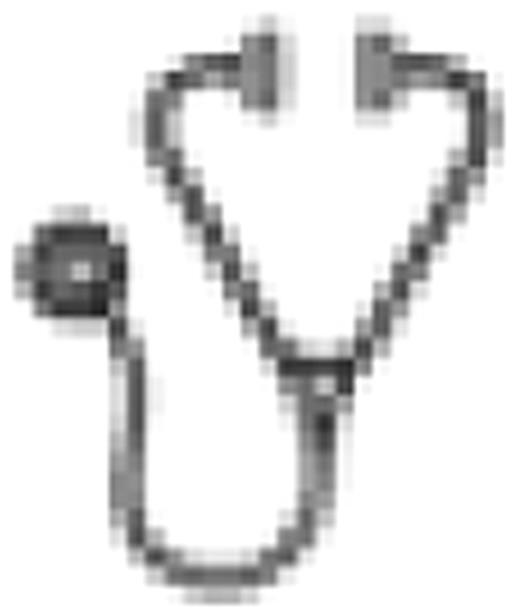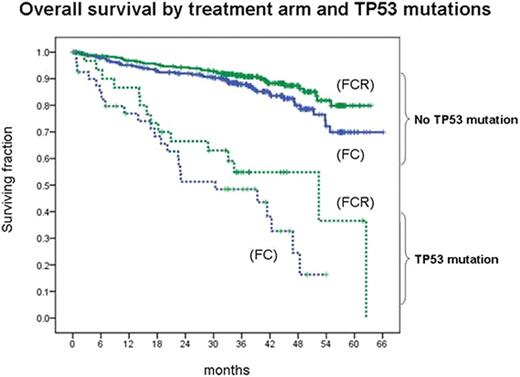Abstract
Poster Board I-289
The international multicenter randomized CLL8 trial evaluated 1st line treatment with FC or FCR in 817 CLL patients. Analysis of TP53 mutation status by a re-sequencing chip (Amplichip, Roche Molecular Systems) and confirmatory direct DNA sequencing were performed in a central reference laboratory. Samples were available for 628 (76.9%) patients and this cohort was representative of the full trial population regarding other baseline prognostic factors and demographics. Outcome was analyzed for subgroups defined by genetic parameters in univariate and multivariate analyses.
The incidence of the TP53 mutations was 11.9% (71/628; 41 in FC arm, 30 in FCR arm). Forty-two of 51 patients (82.4%) with 17p deletion had a TP53 mutation. 5% of patients without 17p deletion (28/553) had a TP53 mutation.
Patients with TP53 mutation showed lower complete response (CR) and overall response (OR) rates as compared to the group without TP53 mutation (6.9 vs. 36.4% and 62.1% vs. 95.3% (p<.01)). Lower response rates were observed for the TP53 mutation groups in both arms (FC and FCR): CR (3.2% and 11.1%), CR+PR (51.6% and 74.1%). Response rates for patients without TP53 mutation were 24.2% (CR (FC)) and 92.2% ORR (FC) vs. 47.8 (CR FCR arm) and 98.2% (ORR FCR).
Median progression free survival (PFS) was significantly shorter for patients with TP53 mutations (12.4 months vs. 45 months) (HR: 4.4 (3.29-5.87) p<0.001). Median PFS was similar for the TP53 mutated subgroup in both treatment arms (FC 12.1 / FCR 15.4 months; HR 0.53 (0.31-0.9) p=0.19). PFS for the patients without TP53 mutations was 35.1 months in the FC arm and 51.9 months in the FCR arm (HR: 0.58 (0.45-0.75) p<0.001).
Patients with TP53 mutation showed a median OS of 39.3 months whereas median OS was not reached in all other patients (HR 6.01 (4.08-8.87) p<0.001).
Comparing OS separately for the treatment arms in the groups defined by presence or absence of TP53 mutation showed a slightly better outcome for the FCR arm for both subsets, although the comparison did not reach statistical significance (TP53 mutations HR: 0.64 (0.33-1.2) p=0.19; no TP53 mutation HR: 0.68 (0.43-1.2) p=0.09) (Fig. 1).
Multivariate analysis was performed by Cox regression including age, stage, treatment arms, IGHV status, genomic aberrations and TP53 mutation. Regarding PFS (n=567), independent prognostic factors were 17p- (HR: 3.6; p<.001), TP53 mutation (HR: 2.2; p<.001), unmutated IGHV (HR: 1.7, p<.001), age (HR: 1.4; p<.001), and FCR treatment (HR: 0.52; p<.001). Regarding OS (n=580), 17p- (HR: 3.5; p<.001), TP53 mutation (HR: 2.6: p<.001), unmutated IGHV (HR: 1.6; p=.035), and FCR treatment (HR: 0.6; p=0.019) were identified as independent factors.
In conclusion, 17p deletion and TP53 mutation remain powerful prognostic markers after 1st line FC and FCR treatment in CLL. When considering the genetic profile and treatment in a multivariate model, FCR improves PFS and OS compared to FC in CLL. TP53 mutations are associated with poor response and survival independent of 17p deletion.
Overall survival of patients in the CLL8 trial based on treatment arm and presence / absence of TP53 mutation.
Overall survival of patients in the CLL8 trial based on treatment arm and presence / absence of TP53 mutation.
Zenz:Roche: Honoraria. Patten:Roche Molecular Systems: Employment. Truong:Roche Molecular Systems: Employment. Wu:Roche Molecular Systems: Employment. Fingerle-Rowson:Roche: Honoraria. Fischer:Roche: Travel reimbursment. Fink:Roche: Travel reimbursment. Jäger:Roche: Honoraria, Research Funding. Böttcher:Roche: Research Funding. Kneba:Roche: Membership on an entity's Board of Directors or advisory committees, Research Funding. Wenger:Roche: Employment. Mendila:Roche: Employment. Hallek:Roche: Consultancy, Research Funding. Döhner:Roche: Research Funding. Stilgenbauer:Roche: Consultancy, Honoraria, Research Funding.

This icon denotes an abstract that is clinically relevant.
Author notes
Asterisk with author names denotes non-ASH members.


This feature is available to Subscribers Only
Sign In or Create an Account Close Modal